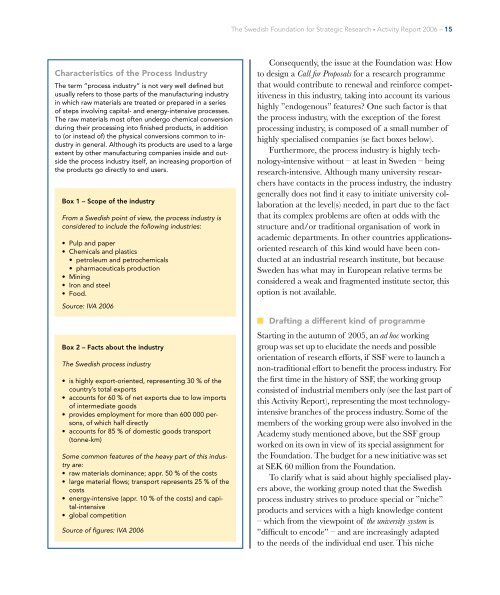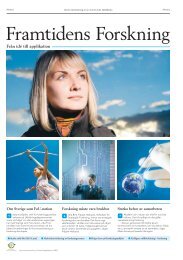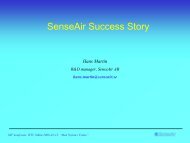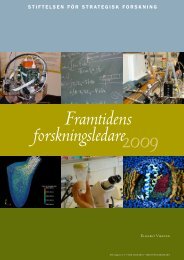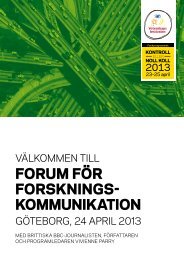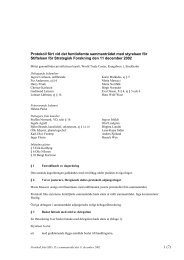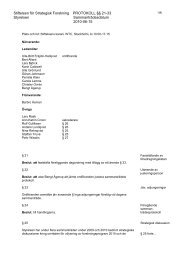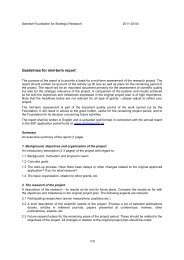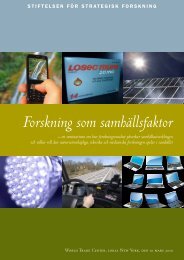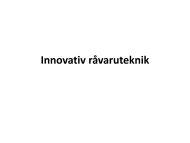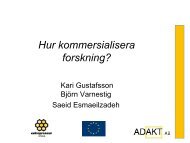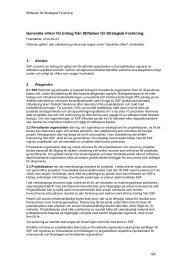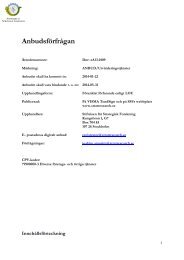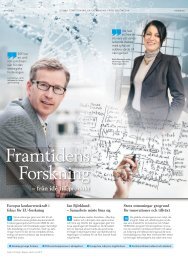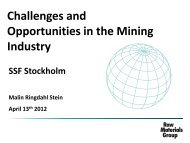Swedish Foundation for Strategic Research Activity Report 2006
Swedish Foundation for Strategic Research Activity Report 2006
Swedish Foundation for Strategic Research Activity Report 2006
You also want an ePaper? Increase the reach of your titles
YUMPU automatically turns print PDFs into web optimized ePapers that Google loves.
The <strong>Swedish</strong> <strong>Foundation</strong> <strong>for</strong> <strong>Strategic</strong> <strong>Research</strong> • <strong>Activity</strong> <strong>Report</strong> <strong>2006</strong> – 15Characteristics of the Process IndustryThe term ”process industry” is not very well defined butusually refers to those parts of the manufacturing industryin which raw materials are treated or prepared in a seriesof steps involving capital- and energy-intensive processes.The raw materials most often undergo chemical conversionduring their processing into finished products, in additionto (or instead of) the physical conversions common to industryin general. Although its products are used to a largeextent by other manufacturing companies inside and outsidethe process industry itself, an increasing proportion ofthe products go directly to end users.Box 1 – Scope of the industryFrom a <strong>Swedish</strong> point of view, the process industry isconsidered to include the following industries:• Pulp and paper• Chemicals and plastics• petroleum and petrochemicals• pharmaceuticals production• Mining• Iron and steel• Food.Source: IVA <strong>2006</strong>Box 2 – Facts about the industryThe <strong>Swedish</strong> process industry• is highly export-oriented, representing 30 % of thecountry’s total exports• accounts <strong>for</strong> 60 % of net exports due to low importsof intermediate goods• provides employment <strong>for</strong> more than 600 000 persons,of which half directly• accounts <strong>for</strong> 85 % of domestic goods transport(tonne-km)Some common features of the heavy part of this industryare:• raw materials dominance; appr. 50 % of the costs• large material flows; transport represents 25 % of thecosts• energy-intensive (appr. 10 % of the costs) and capital-intensive• global competitionSource of figures: IVA <strong>2006</strong>Consequently, the issue at the <strong>Foundation</strong> was: Howto design a Call <strong>for</strong> Proposals <strong>for</strong> a research programmethat would contribute to renewal and rein<strong>for</strong>ce competitivenessin this industry, taking into account its varioushighly ”endogenous” features? One such factor is thatthe process industry, with the exception of the <strong>for</strong>estprocessing industry, is composed of a small number ofhighly specialised companies (se fact boxes below).Furthermore, the process industry is highly technology-intensivewithout – at least in Sweden – beingresearch-intensive. Although many university researchershave contacts in the process industry, the industrygenerally does not find it easy to initiate university collaborationat the level(s) needed, in part due to the factthat its complex problems are often at odds with thestructure and/or traditional organisation of work inacademic departments. In other countries applicationsorientedresearch of this kind would have been conductedat an industrial research institute, but becauseSweden has what may in European relative terms beconsidered a weak and fragmented institute sector, thisoption is not available.n Drafting a different kind of programmeStarting in the autumn of 2005, an ad hoc workinggroup was set up to elucidate the needs and possibleorientation of research ef<strong>for</strong>ts, if SSF were to launch anon-traditional ef<strong>for</strong>t to benefit the process industry. Forthe first time in the history of SSF, the working groupconsisted of industrial members only (see the last part ofthis <strong>Activity</strong> <strong>Report</strong>), representing the most technologyintensivebranches of the process industry. Some of themembers of the working group were also involved in theAcademy study mentioned above, but the SSF groupworked on its own in view of its special assignment <strong>for</strong>the <strong>Foundation</strong>. The budget <strong>for</strong> a new initiative was setat SEK 60 million from the <strong>Foundation</strong>.To clarify what is said about highly specialised playersabove, the working group noted that the <strong>Swedish</strong>process industry strives to produce special or ”niche”products and services with a high knowledge content– which from the viewpoint of the university system is”difficult to encode” – and are increasingly adaptedto the needs of the individual end user. This niche


